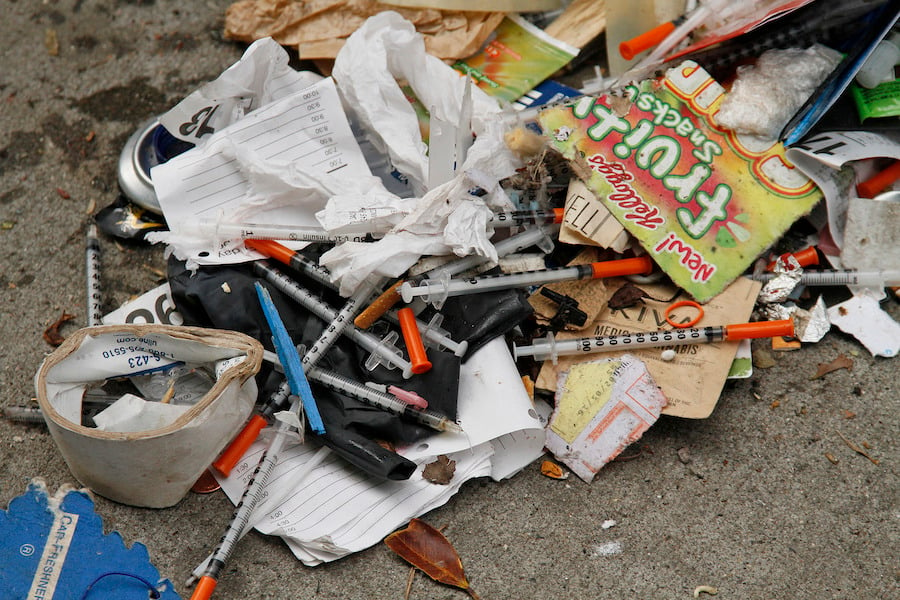SAN FRANCISCO (CN) — Drug policy and criminal justice experts called San Francisco Mayor London Breed’s new plan to crack down on open-air dealing and drug use ineffective and cruel.
Breed is steadfast in her commitment to the new plan, which involves escalating arrests in the hardest-hit areas, such as the Tenderloin and South of Market (SoMa) neighborhoods. Now Breed’s plan will have added support from the federal government. Operation Overdrive will provide federal assistance to the city to help stop drug use in the coming months.
When asked for comment on the new designation, Breed’s office referred to a tweet by the mayor.
“Tackling open-air drug dealing requires coordinated local, state, and federal efforts, and we welcome this additional support,” Breed tweeted.
Breed is not waiting for federal assistance to fight the drug problem, however. According to the city, 53 people were cited or booked for public drug use between May 30 and June 18. Most were not residents of San Francisco, and 28% had outstanding warrants.
Critics of Breed’s new plans say drug addiction is very complicated and that there is little to no data that more arrests lead to better outcomes.
The Drug Policy Alliance and the National Harm Reduction Coalition released a joint statement condemning Breed’s methods and citing data that about 60% of those arrested under the new polices were people of color. The statement linked to a study by Vera, a criminal justice reform organization, that linked incarceration to increased overdoses, especially in communities of color.
Jeannette Zanipatin, California state director of the Drug Policy Alliance, said in a statement that it is “shameful” that San Francisco's politicians called for escalating arrests when overdose deaths are rising.
“Doubling down on drug war strategies that brought us to where we are today will only contribute to more loss of life. The increased police presence will also disrupt the safety of the immigrant community by eliciting stress and fear of police interaction, making it less likely that they will access services in the event of a health emergency,” Zanipatin said. “This population and other marginalized communities deserve real solutions on all fronts, not more criminalization that will only exacerbate barriers to health interventions.”
Jonathan Simon, a law professor at UC Berkeley, said that cities have attempted to arrest their way out of drug use, most notably in New York City in the 1990s, with little success.
“The mayor talks as if she has a bigger ambition to not just hide the problem, but to solve it, and I think there’s virtually no evidence in support of the proposition that you can arrest your way out of drug dependence,” Simon said. “You can disrupt people’s lives in ways that make them more vulnerable to drug overdoses.”
Simon said that more arrests would likely push drug users out of sight in the hardest-hit neighborhoods, such as Tenderloin and SoMa, but that they would still be present, just less visible. He understands why the city wants to clean up the streets but questions the mayor’s methods.
“I certainly don’t think arresting your way, even if the goal is to push them somewhere else, is the most humane, effective, or even most efficient way to do it,” Simon said.
Simon said more arrests would likely be more expensive to taxpayers than “harm reduction” approaches, where addicts receive opportunities and resources to get help. He added that arresting people and cycling them through the system is complicated and very expensive, especially if those arrested have mental health or addiction problems.
“If you’re concerned about spending, I think it’s kind of hard to argue for the police-first or arrest-first approach here,” Simon said.
Breed said that the people arrested did not opt for the treatment offered. Simon questions if forced treatment works at all.
“The overall social science research on those programs was not showing a clear level of success for that,” he said.
Instead, Simon wonders why Breed abandoned the Tenderloin Center, which closed last December, against the urging of the Board of Supervisors. The center was planned as a temporary site to reduce overdoses and connect users to services.
Supervisor Dean Preston, who represents the Tenderloin neighborhood that has seen a rash of drug use, criticized Breed for the center's closure during the most recent board meeting.
Preston said Breed’s stricter policies went against the city's Department of Health guidelines and would harm more people. The exchange grew testy, with Breed calling Preston "another white man addressing Black and brown people as though you're the savior of those people and you speak for them." Preston accused Breed of bowing to business interests with her new policy.
Preston’s office did not respond to requests for comment before publication time.
Defending the closure of the linkage center, Breed said it shut down because it was not working as intended. People weren’t seeking treatment, but were looking to use drugs.
Laura Guzman, acting executive director at the National Harm Reduction Coalition, vehemently disagreed with Breed’s characterization of the Tenderloin Center.
“Subjecting people to police contact and locking them up is not love. San Francisco is in fact aware of other options to save lives and help people access treatment and at times has chosen to partially invest in them — like the overdose prevention component of the Tenderloin Linkage Center, which saved 333 lives and offered access to safety and support. And it even led many others to voluntarily access treatment,” Guzman said in a statement.
Breed’s budget, currently before the Board of Supervisors, provides funding for the city to continue its crackdown on drug use, including more police officer positions.
Subscribe to Closing Arguments
Sign up for new weekly newsletter Closing Arguments to get the latest about ongoing trials, major litigation and hot cases and rulings in courthouses around the U.S. and the world.









